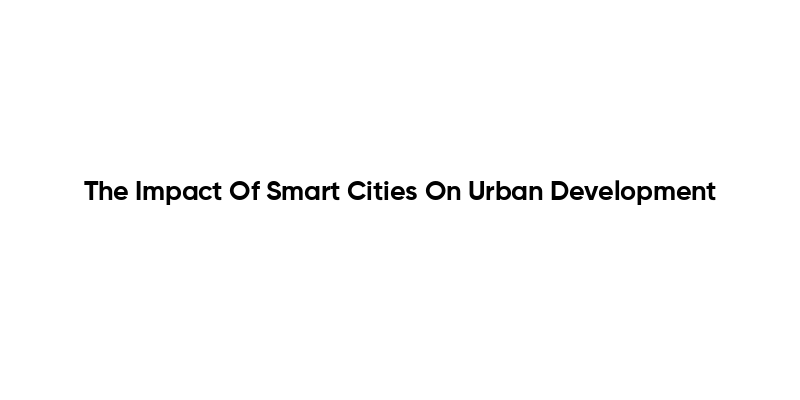In recent years, the concept of smart cities has emerged as a transformative force in urban development. The impact of smart cities on urban development is profound, as they leverage technology and data to enhance the quality of life for residents while promoting sustainable growth. By integrating advanced technologies such as IoT, big data, and AI, smart cities are redefining how urban spaces function, making them more efficient, livable, and responsive to the needs of their inhabitants.
As we delve deeper into the impact of smart cities on urban development, this article will explore various aspects, including the role of technology in urban planning, the benefits of smart infrastructure, and the importance of citizen engagement in creating a connected community. You will learn how smart cities are addressing challenges such as traffic congestion, energy consumption, and waste management, ultimately leading to a more sustainable urban environment.
Furthermore, we will discuss real-world examples of successful smart city initiatives and the lessons learned from these projects. By understanding the impact of smart cities on urban development, you will gain insights into the future of urban living and the potential for innovation to shape our cities. Join us as we uncover the exciting possibilities that smart cities hold for urban development and how they can pave the way for a brighter, more sustainable future.
Smart cities represent a transformative approach to urban development, leveraging technology to enhance the quality of life for residents. This article explores various aspects of smart cities and their implications for urban growth and sustainability.
Enhanced Infrastructure and Connectivity
One of the most significant impacts of smart cities on urban development is the enhancement of infrastructure and connectivity. Smart technologies, such as IoT (Internet of Things) devices, enable real-time monitoring and management of urban infrastructure, including transportation systems, utilities, and public services. This connectivity allows for more efficient use of resources, reducing waste and improving service delivery.
For instance, smart traffic management systems can analyze traffic patterns and adjust signal timings to minimize congestion. This not only improves travel times but also reduces emissions, contributing to a cleaner urban environment. As cities adopt these technologies, the overall infrastructure becomes more resilient and adaptable to changing urban dynamics.
Sustainable Urban Development
Sustainability is a core principle of smart city initiatives. By integrating renewable energy sources, smart grids, and energy-efficient buildings, cities can significantly reduce their carbon footprint. Smart cities promote sustainable urban development by encouraging the use of green technologies and practices that minimize environmental impact.
Moreover, smart waste management systems utilize sensors to optimize collection routes and schedules, reducing fuel consumption and operational costs. This focus on sustainability not only benefits the environment but also enhances the quality of life for residents, making cities more livable and attractive.
Citizen Engagement and Participation
Smart cities foster greater citizen engagement and participation in urban governance. Through digital platforms and mobile applications, residents can provide feedback, report issues, and participate in decision-making processes. This increased transparency and communication empower citizens to take an active role in shaping their communities.
For example, many smart cities implement participatory budgeting initiatives, allowing residents to vote on how public funds are allocated. This not only enhances civic engagement but also ensures that urban development projects align with the needs and preferences of the community, leading to more successful outcomes.
Economic Growth and Innovation
The development of smart cities can stimulate economic growth and innovation. By attracting tech companies and startups, cities can create job opportunities and foster a culture of innovation. Smart city initiatives often lead to the establishment of innovation hubs and research centers, driving advancements in technology and urban solutions.
Additionally, the integration of smart technologies can enhance the efficiency of local businesses, enabling them to operate more effectively and compete in a global market. This economic dynamism contributes to the overall prosperity of urban areas, making them more resilient to economic fluctuations.
Challenges and Considerations
Despite the numerous benefits, the transition to smart cities also presents challenges. Issues such as data privacy, cybersecurity, and the digital divide must be addressed to ensure that all residents can benefit from smart city initiatives. Policymakers must develop frameworks that protect citizens’ data while promoting innovation and accessibility.
Furthermore, the implementation of smart technologies requires significant investment and collaboration among various stakeholders, including government agencies, private companies, and community organizations. Addressing these challenges is crucial for the successful development of smart cities that are inclusive and equitable.
| Aspect | Description |
|---|---|
| Definition | Smart cities utilize digital technology to enhance performance, efficiency, and quality of life in urban areas. |
| Infrastructure | Smart cities invest in advanced infrastructure, including IoT devices, smart grids, and sustainable transportation systems. |
| Data Utilization | Data collected from various sources is analyzed to improve city services, optimize resource management, and enhance decision-making. |
| Environmental Impact | Smart cities promote sustainability through energy-efficient buildings, waste management systems, and reduced carbon footprints. |
| Economic Growth | By attracting businesses and fostering innovation, smart cities can stimulate economic development and job creation. |
| Social Inclusion | Smart city initiatives aim to improve accessibility and inclusivity, ensuring that all citizens benefit from urban advancements. |
| Challenges | Implementation challenges include data privacy concerns, high costs, and the need for collaboration among stakeholders. |
| Future Trends | Future smart cities will likely focus on resilience, adaptability, and enhanced citizen engagement through participatory governance. |
This HTML document provides a structured overview of the impact of smart cities on urban development, formatted as a table for clarity and ease of reading.



